Thoughtful, well-structured, strategic sales questions and needs analysis questions are central to any sales professional's ability to provide value to prospects.

We‘re in the age of the empowered buyer, and potential customers are as complex as they’ve ever been. They're busy, well-informed, and often reluctant to share information — with a diverse array of wants, needs, interests, and buying preferences.
Whether you're new to sales and looking for a go-to list of sales qualification questions or a manager looking to test new questions with your team, this list of great sales questions to ask customers will help you identify your prospects' core needs.
Table of Contents
- Sales Questions to Ask Customers
- Strategic Questions to Ask Customers
- Needs Analysis Questions About Goals
- Needs Analysis Questions About Weaknesses
- Needs Analysis Questions About Buying Processes
- Questions to Ask Customers About Your Product
- Questions to Ask Customers to Close the Deal
Sales Questions to Ask Customers
Here are some of the most critical questions salespeople should ask their prospects.
- “Do we need to include any other decision-makers in our conversation?”
- “If timeline or budget were not constraints, what would your ideal solution look like?”
- “Why is this a priority for you now?”
- “What challenges do you think will come up as you try to purchase the product?”
- “Are you currently using another solution? If so, why are you switching?”
- “Has your team tried to use a similar product? If so, how did it go?”
- “How can I make this process as easy as possible?”
- “What’s your approximate budget for this project?”
- “What other tools do you use in your day-to-day?”
- “What challenges have you experienced in the past year related to [product-related goal]?”
Asking the right questions is crucial when speaking with a prospect for the first or second time. As a salesperson, your job is to discover their core needs quickly and succinctly. The questions above will uncover needs — while also helping you figure out whether this customer is the right fit for your product.
After you get your customer’s answers, you can customize your sales presentations and pitches to their specific circumstances.
Next, we‘re going to cover some key strategic questions from real sales leaders. Let’s take a look.
Strategic Questions to Ask Customers
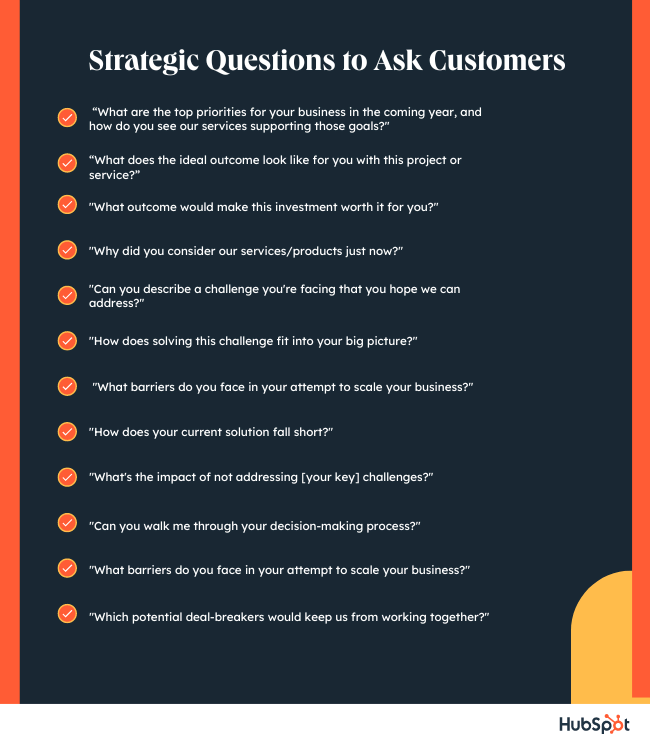
1. “What are the top priorities for your business in the coming year, and how do you see our services supporting those goals?"
According to Magee Clegg, CEO of Cleartail Marketing, “This question does two things incredibly well — it helps prospects articulate their short-term goals, giving you insights into their immediate needs, and it positions your services as a solution within the context of their strategic planning. It’s a question that naturally leads to a deeper dialogue about how your offerings align with their objectives.”
2. “What does the ideal outcome look like for you with this project or service?”
This question is essentially a bit more of a focused play on the sixth question on this list. Clegg says that this question "allows the prospect to envision the future success that your service can bring them. It turns the conversation into a more positive, forward-thinking one, where the prospect isn‘t just focused on what’s wrong now but on the potential for improvement and growth.
“This question has helped me transform sales conversations at Cleartail Marketing into collaborative strategy sessions, where the prospect sees us as a partner in achieving their vision, rather than just another vendor.”
3. “What outcome would make this investment worth it for you?”
This question is another way to phrase the previous one with a bit more of a product-specific, value-oriented edge. Bayu Prihandito, Founder of Life Architekture, suggests you ask it because it helps with “Understanding your prospect's definition of success helps align your offer with their expectations. It clarifies their goals and sets the stage for how your product or service can meet them.”
4. “Why did you consider our services/products just now?”
Prihandito recommends asking this question because it can help you “find out the 'why' behind their interest, understanding the urgency and any immediate motivations for them to look for solutions.”
5. “Can you describe a challenge you're facing that you hope we can address?”
Prihandito says salespeople should ask this question because “[being] able to directly pinpoint specific problems allows you to understand where your offering will fit best into their current situation.”
6. “How does solving this challenge fit into your big picture?”
Prihandito suggests asking this question because “linking your prospect's immediate need to bigger goals gives you an understanding of their values and long-term plans. Then, you can align your solution within a larger context, which will increase its perceived value.”
7. “What barriers do you face in your attempt to scale your business?”
According to Baidhurya Mani, Founder of SellCoursesOnline, “Scaling the business is often the number-one reason business leaders integrate technology into their operations. When you can pinpoint what their barriers to scaling are, then you can also determine what solutions to offer them in this scenario. Whatever challenge is preventing them from growing their business, that is your prospect's premium priority at the moment, and that is the number-one need they need you to meet.”
8. “How does your current solution fall short?”
Casey Jones, Founder of CJ&CO, says asking this question can help you identify key gaps in your prospect‘s operations. According to him, this question helps you "[dig] for dissatisfaction — this is where you’ll find the gap your product or service can fill."
9. “What's the impact of not addressing [your key] challenges?”
Jones also suggests asking this question because it allows you to “[emphasize] urgency. It makes the cost of inaction real, often a powerful motivator to move forward.”
10. “Can you walk me through your decision-making process?”
Jones says that this question “unpicks the power structure, timelines. We understand the 'how'—crucial to tailor the pitch.”
11. “What barriers do you face in your attempt to scale your business?”
According to Baidhurya Mani, Founder of SellCoursesOnline, “Scaling the business is often the number-one reason business leaders integrate technology into their operations. When you can pinpoint what their barriers to scaling are, then you can also determine what solutions to offer them in this scenario. Whatever challenge is preventing them from growing their business, that is your prospect's premium priority at the moment, and that is the number-one need they need you to meet.”
12. “Which potential deal-breakers would keep us from working together?”
Johannes Larsson, Founder and CEO of JohannesLarsson.com, “This will allow your prospect to voice any concerns or reservations they might have about the product or service. By addressing these upfront, you can demonstrate your commitment to understanding and resolving issues, which builds trust and rapport with the prospect. This question will also help you gather valuable insights into the prospect's priorities and non-negotiables so you can tailor your approach accordingly.”
.png)
Free Guide: 101 Sales Qualification Questions
101 Questions to Ask Contacts When Qualifying, Closing, Negotiating, and Upselling.
- Budget Questions
- Business Impact Questions
- Competitor Questions
- And More!
Needs Analysis Questions
- What is your boss or team hoping to accomplish in the next year?
- What do you perceive as your team’s greatest strength? Weakness?
- From your perspective, what do you perceive your needs to be? How important are they?
- Which resource could you use more of?
- What are your buying criteria and success criteria?
- What do you like best about your current system? What would you like to see changed?
- Would you rather cut costs, save money, or increase productivity?
Needs Analysis Questions About Goals
13. “What are your short-term goals? Long-term goals?”
According to Uka Tomikis, CEO of Messente, asking this question is important because “[understanding] a prospect's goals enables you to align your solution with their objectives and demonstrate how you can contribute to their success. This indicates your interest in their business success rather than just completing a transaction.”
14. “What's been preventing you from reaching these goals?”
Tomikis says that asking this question is crucial because “[identifying] hurdles allows you to directly address how your product or service will overcome these limitations. It also helps to prioritize which demands are most urgent.”
15. “How are you currently addressing these challenges?”
Tomikas recommends asking this question because “knowing a prospect's current solutions lets you differentiate yours by emphasizing new features or benefits that fill gaps in their current strategy.”
16. “What does the ideal solution look like to you?”
Tomikas asserts that asking this question “lets you grasp the prospect's expectations and tailor your pitch accordingly. It highlights their top features or outcomes, allowing you to focus on the most important components of your service.”
17. “What criteria will you use to evaluate solutions?”
Tomikas recommends asking this question because “[understanding] your prospect's evaluation criteria provides insight into what is most important to them, whether it be cost, ease of use, scalability, or support. It enables you to adapt your proposal to fit these criteria.”
18. “Have you ever solved this problem before? What worked and what did not?”
Tomikas recommends you ask this question because “[learning] from previous attempts allows you to understand what not to propose and what might be a better strategy, preventing recurrent failures and building trust by respecting their experience.”
19. “What is your boss or team hoping to accomplish in the next year?”
This is another question that covers a prospect‘s goals — but this one adds an element of specificity that the previous ones don’t, enabling you to really hone in on what the business is hoping to achieve.
Pro-Tip: Be sure to stress that you want to know company leadership‘s or the broader org’s goals here. This question is meant to get prospects thinking beyond themselves. You can ask how your solution will improve their day-to-day later — here, you want them to place your offering in a “bigger picture” context.
20. “What deadlines are you currently up against?”
Add more urgency to the conversation by explicitly asking your customer if they’re up against any deadlines. Once you find out if they have a set date where they must achieve or do something, you can highlight your solution as a tool for getting there more quickly.
Pro-Tip: This question is good for disqualifying prospects. If your prospect is working on a timeline you can't realistically accommodate, you can end the engagement and spare yourself crucial time and resources.
21. "How do your team’s objectives play into your department's strategy?”
This question might seem extraneous, given that we’ve already covered two questions about objectives and goals — but knowing the role of their team in the department’s larger strategy can hint at the needs of the entire department.
For instance, if you’re selling an SEO software solution, you might want to listen for the team’s role in increasing traffic, meaning that the business is intending to grow its organic acquisition. If your software also offers acquisition tools, you can pitch those as well.
Needs Analysis Questions About Weaknesses
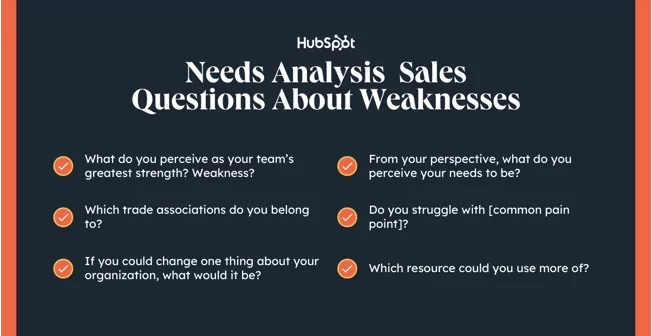
22. “What do you perceive as your team’s greatest strength? Weakness?”
You need to have a sense of both aspects of this question. You want to have a frame of reference that enables you to position your solution as a resource for enhancing your prospect‘s company’s strengths and accommodating its weaknesses.
Pro-Tip: Ask about your prospect‘s greatest strengths first — you don’t want to set too negative a tone with this line of questioning.
23. “Which trade associations do you belong to?”
This question will come in handy if you’re selling marketing software, sales software, or PR services. By asking which trade associations they’ve already joined, you can begin to figure out what your customer is doing to network and get their word out about their business.
Pro-Tip: Understand that not belonging to a trade association could be a potential weakness — as it can impede a company's ability to find more customers using your software.
24. “If you could change one thing about your organization, what would it be?”
This is a great question to keep the conversation flowing while learning more about the challenges and pitfalls of the organization at large. Even if the answer is unrelated to the product, you can begin to understand some of the organizational challenges and pitfalls your customer deals with.
Pro-Tip: Give your prospect room to elaborate here — this is one of the more potentially constructive, revealing questions you can ask. Don't interject with your suggestions about what you think they should change.
25. “From your perspective, what do you perceive your needs to be? How important are they?"
A better alternative to “What are your needs?”, this question will specifically ask for your customer’s perception of their needs, not necessarily their actual needs. After asking a series of needs analysis questions, you’ll likely have a better understanding of your customer’s needs than they do. But it’s important to understand what they perceive their needs to be.
26. “Do you struggle with [common pain point]?”
This is a classic question to uncover your customer’s challenges. It works because it puts a name to the pain point. Your customer might not even know what their pain point is until you mention it outright. Sometimes, they might be used to dealing with the challenge and not even bring it up. By posing this question, you force them to reckon with it.
Pro-Tip: This is a good opportunity to raise pain points that your solution is uniquely positioned to address, but you need to understand your vertical as thoroughly as possible to touch on reasonable, relevant ones. “Common pain points” vary by factors like scale and industry — so don't just throw random examples out for the sake of throwing them out.
27. “Which resource could you use more of?”
Ask this question to not only understand what resources you could offer right then and there — but to see the types of resources your team could create to convert more prospects. You can send this information straight to your marketing department so you can begin to nurture leads with this new resource.
Pro-Tip: Your customer might also respond in general terms: They might need a bigger budget or a bigger team. Use this information to further qualify them or figure out if you could create a better package for them.
Needs Analysis Questions About Buying Processes
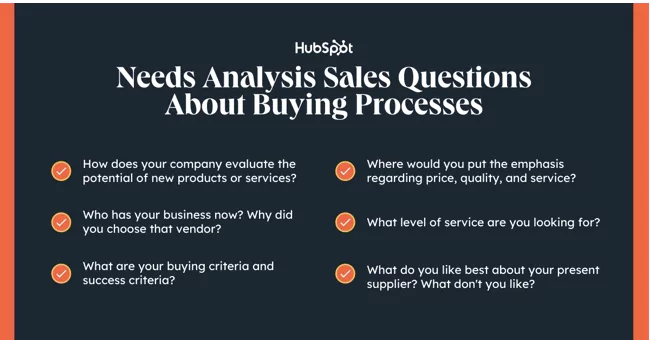
28. “How does your company evaluate the potential of new products or services?”
If you want to sell the product, you need to know how your customer evaluates a product prior to purchasing it. The main benefit of this question is that it’s broad enough that the customer can talk about anything — they’re not being forced to give a certain answer.
29. “Who has your business now? Why did you choose that vendor?”
Your customer might be using another solution — an extremely important piece of information to know. If you find out why, you can also figure out what has won their business in the past and use that to your advantage (or even point out ways that you’re better than your competitor). A good question to follow up with would be, “Why are you switching?”
30. “What are your buying criteria and success criteria?”
This question prompts your customer to describe, in general terms, the key factors for choosing a product. But don’t forget the second part about success criteria. For them, is a success criterion met when they gain more customers? Streamline operations?
31. “Where would you put the emphasis regarding price, quality, and service?”
Use this question to choose whether to upsell your customer or create a discounted package. It can also help you further qualify them if you sell an enterprise product that has a high contract value or if your service team is still growing and developing.
32. “What level of service are you looking for?”
Will they need extensive onboarding? Or do they want a solution that they can simply plug in and start using straight away? Knowing the level of service and attention they expect will help you gauge their needs once onboarding has started.
33. “What do you like best about your present supplier? What don't you like?”
This question should only be asked after you’ve found out that they’re currently using another solution. By finding out what they like and don’t like, you can begin to understand where your product makes up for their current solution’s pitfalls.
34. “What do you look for in the companies you do business with?”
It’s important to understand what your customer is looking for in more general terms. Is it a long-standing relationship? Or speedy service interactions? Or a dedicated contact whom they can reach out to?
35. “What might cause you to change suppliers?”
Customer churn is a real and unpleasant reality for B2B businesses. You want to find out, from the get-go, what could cause your customer to churn. If they don’t have an answer, try asking, “What caused you to leave a supplier in the past?”
Pro-Tip: Try to go for an anecdotal response — social proof is a major asset when you ask a question like this.
36. “What do you like best about your current system? What would you like to see changed?”
This question speaks not to the company they’re doing business with, but to the product that that company sells. It’s a valuable question because you get to find out what’s going well and what’s going wrong on a product level.
37. "How do you typically reach purchasing decisions?”
Is it by attending a team-wide meeting, and everyone votes on whether to adopt a solution or not? Does it depend on the contract value of the product? If you’re selling a cheaper product, your customer might have a much more speedy process. But if your product is pricier, they might have a different process.
38. “Would you rather cut costs, save money, or increase productivity?”
This is another way to uncover where your customer’s priorities lie. The fun part is that it offers choices in a “Would you rather” format, making it easier to ask and leading to a more conversational or casual answer.
39. “Which product features would lead to a purchasing decision?”
Some product features might not be necessary to your customers, while others might be critical. Whatever your customer mentions here, use that to highlight that exact feature in your product.
40. “If you’ve considered a similar product in the past but didn’t purchase it, why?”
Has your customer come close to making a similar purchase, but pulled back at the last second? This question will give you insight into potential objections you could face as you near a closed deal.
41. “On average, how long does it take for your team to purchase a product?”
Take advantage of this question to find out how long you could potentially be in conversation with this customer.
Questions to Ask Customers About Your Product
When you‘re checking in with current clients with the hope of either upselling, cross-selling, or renewing, it’s imperative you ask the right questions.
If you fail to ask tough questions about the good and bad of your product/service, you risk missing warning signs they're unhappy and would consider churning to a competitor.
Don't leave the door open. Close it with these questions:
- “On a scale of one to 10, how happy are you with our product?”
- “Why did you give us that score?”
- “Can you explain the weaknesses or challenges you've found in our product/service so far?”
- “What do you love about our product/service?”
- “How likely are you to recommend our product/service to a friend or colleague?”
- “How has adoption and internal use gone in your team?”
- “Do you feel you've received outstanding customer service?”
- “Are you ready to renew today?” (Only if the first seven questions have had positive answers)
- “What can we do to earn your business for another year?”
- “Would you be interested in our new add-on Feature X?”
Questions to Ask Customers to Close the Deal
As you near the end of your conversation with a customer, you want to find out, in no uncertain terms, how you can get their business. Use your customer’s background as a guidepost for how you’ll word this question.
If you get the sense your customer doesn’t like being pushed or is on the fence, try to close in a more circumventive way. Here are some options:
- “What will it take for us to do business?”
- “How soon can we begin?”
- “What is my best shot for winning your account?”
- (If they’re a returning customer) “What did we do in the last sale that impressed you most?”
- "What’s the best time to touch base before you present the product to stakeholders?”
Ask Better Questions to Analyze Your Customer’s Needs
Great sales questions enable you to tailor your messaging to your prospects' goals and show them your solution is the best choice. By asking the right questions, you can further qualify your prospects, close more deals, and increase recurring revenue at your company.
Editor's note: This post was originally published in May 2014 and has been updated for comprehensiveness.
![Free Download: 101 Sales Qualification Questions [Access Now]](https://no-cache.hubspot.com/cta/default/53/e97d6603-b40e-4085-ad55-0074b7351ead.png)
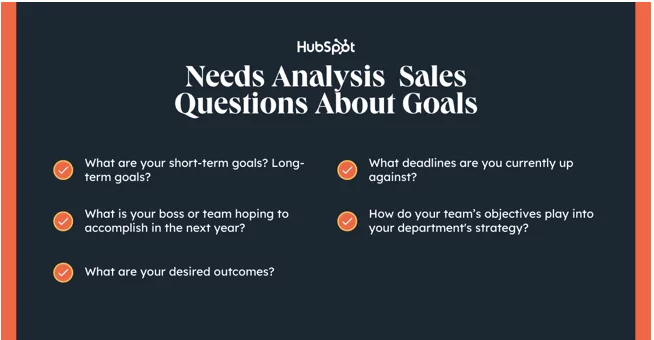
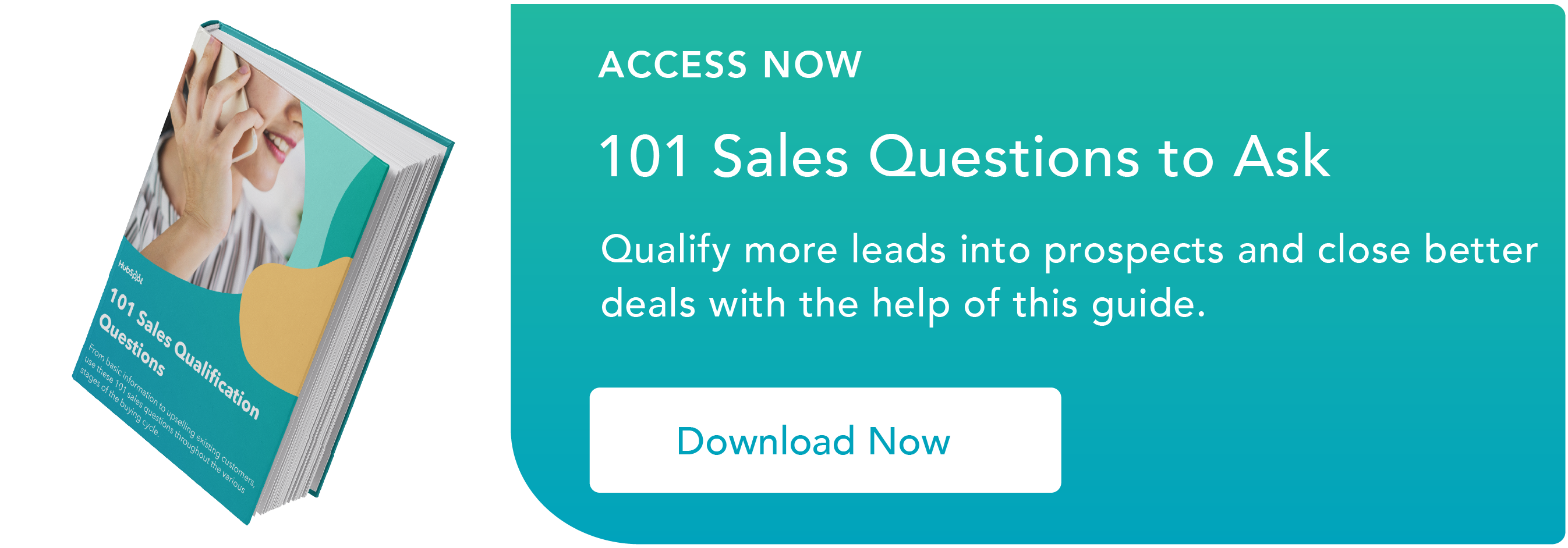
![How to Use BANT to Qualify Prospects in 2024 [Expert Tips]](https://blog.hubspot.com/hubfs/bant-questions-6606f7b6c0d9e.webp)


![21 Signs Your Buyer Is a Poor Fit [Sales Process Checklist], According to HubSpot's Former Sales Director](https://blog.hubspot.com/hubfs/Bad%20fit%20checklist.jpg)





![What a Client Intake Form Is & What It Should Look Like [Template]](https://blog.hubspot.com/hubfs/CLIENT%20INTAKE%20FORM%20%281%29.jpg)